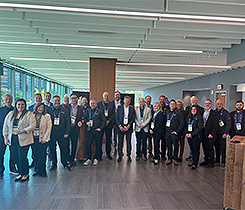The role of management in retail propane
This is the third in a series on business topics inspired by the 20th century business management icon Peter Drucker.
Results are obtained by exploiting opportunities, not solving problems. Fixing problems only restores a broken situation back to normalcy; it does not create new value.
 Carl Hughes LP/Gas Magazine Columnist |
This is certainly pertinent to our industry. A retail propane company whose focus is primarily on the solving of problems is a company whose key management is not focused on the future, and certainly not prepared to identify and exploit new opportunities. The first step is to recognize that all efforts are not equal in their contribution to value creation.
Consider analyzing your time spent by separating all activities into these two categories. How much time do you spend solving problems, and how much time identifying and pursuing opportunities?
The operational demands of retail propane distribution are enormously distracting. The ongoing needs of employees and customers, along with the need to maintain equipment, create problems that require solutions. These are fundamental activities of our business that I am not suggesting we ignore.
What I am suggesting is that retail propane companies do not grow and increase in value if senior management spends all its time simply putting out fires and solving problems. The resolution of a particular problem – the repair of a truck, replacing a poor hire with a new hire or the repair of an installation – only restores the economic condition to its previous state. It is the pursuit of opportunities in your market that creates new value for your company.
Winners vs. Losers
Management must constantly analyze and select those business activities that represent the future growth of the company (Winners) and shed those that no longer deliver profits (Losers). It’s a consistent Drucker theme that a symptom of less successful companies is the inability to drop Losers soon enough, or at all.
I can think of two examples in our industry:
A company selling its cylinder exchange business to a competitor after years of unprofitability is an example of selling a Loser.
A company that retains a transport division that was added years ago in order to ensure supply – and now is a clear financial and resource drag – is an example of not dropping a Loser.
Do a few things right
Although many retailers ignore this simple Drucker suggestion, it can be observed in practice in all successful retail propane companies.
The clutter of too many objectives, too many customer types and too many initiatives almost always guarantees that the scarce resources of key employees’ time and capital are directed partially to losing activity – to the detriment of the Winners in the company.
Market share leadership
Drucker often addressed well-known U.S. companies whose achievements caught a lot of public attention in terms of growth and market share attained, yet whose profits per unit sold and profits in total were significantly less than competitors that had less market share.
What is important for us to accept in our businesses is that management defines what they mean by leadership – that of market share or of profitability. Some rare companies can do both, but only through the pursuit of leadership through profitability, not the other way around.
Does your company control the lion’s share of business in your market or is your business model based on attaining leadership in profitability? Are profitability measurements and goals a part of your culture?
Regarding People
It is the role of management to capitalize on the strengths of the individual through joint accomplishments, minimizing or eliminating individual weaknesses.
An effective measurement of a successful management team is one that successfully utilizes the talents of average people to accomplish its objectives. The inverse could be inferred for those companies with high turnover.
Carl Hughes is vice president of business development for Inergy LP. He can be reached at
Chughes@InergyServices.com
or 816-842-8181.
















